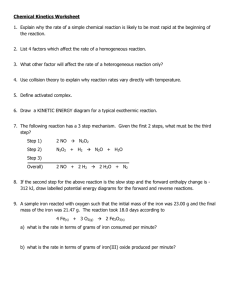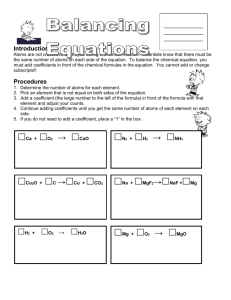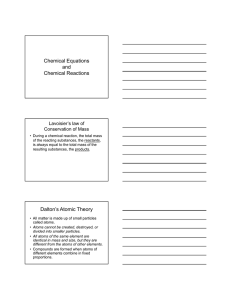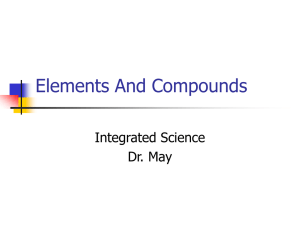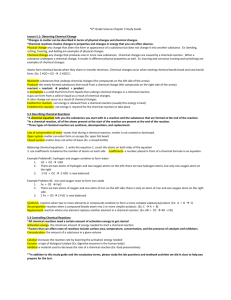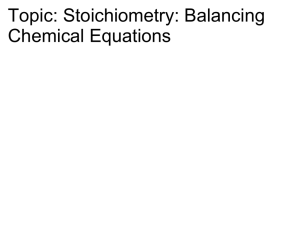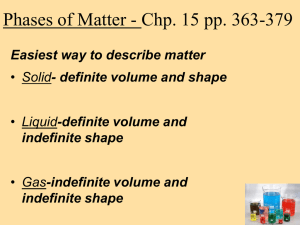SCH4U - Mandatory Review Set
advertisement
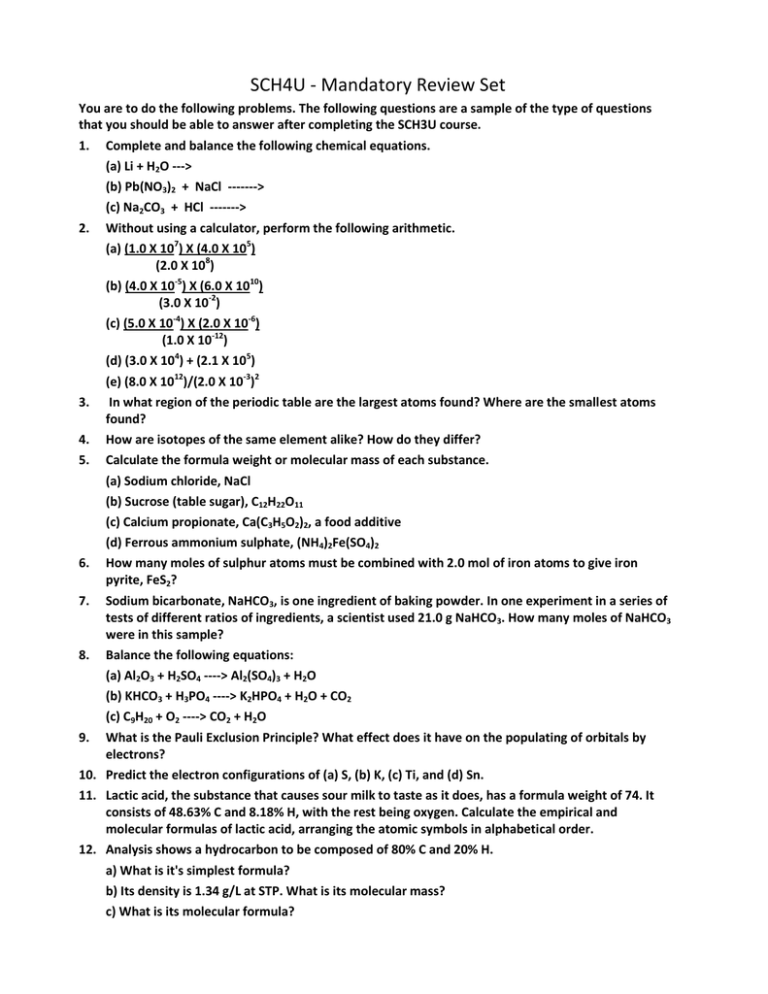
SCH4U - Mandatory Review Set You are to do the following problems. The following questions are a sample of the type of questions that you should be able to answer after completing the SCH3U course. 1. Complete and balance the following chemical equations. (a) Li + H2O ---> (b) Pb(NO3)2 + NaCl -------> (c) Na2CO3 + HCl -------> 2. Without using a calculator, perform the following arithmetic. (a) (1.0 X 107) X (4.0 X 105) (2.0 X 108) (b) (4.0 X 10-5) X (6.0 X 1010) (3.0 X 10-2) (c) (5.0 X 10-4) X (2.0 X 10-6) (1.0 X 10-12) (d) (3.0 X 104) + (2.1 X 105) (e) (8.0 X 1012)/(2.0 X 10-3)2 3. In what region of the periodic table are the largest atoms found? Where are the smallest atoms found? 4. How are isotopes of the same element alike? How do they differ? 5. Calculate the formula weight or molecular mass of each substance. (a) Sodium chloride, NaCl (b) Sucrose (table sugar), C12H22O11 (c) Calcium propionate, Ca(C3H5O2)2, a food additive (d) Ferrous ammonium sulphate, (NH4)2Fe(SO4)2 6. How many moles of sulphur atoms must be combined with 2.0 mol of iron atoms to give iron pyrite, FeS2? 7. Sodium bicarbonate, NaHCO3, is one ingredient of baking powder. In one experiment in a series of tests of different ratios of ingredients, a scientist used 21.0 g NaHCO3. How many moles of NaHCO3 were in this sample? 8. Balance the following equations: (a) Al2O3 + H2SO4 ----> Al2(SO4)3 + H2O (b) KHCO3 + H3PO4 ----> K2HPO4 + H2O + CO2 (c) C9H20 + O2 ----> CO2 + H2O 9. What is the Pauli Exclusion Principle? What effect does it have on the populating of orbitals by electrons? 10. Predict the electron configurations of (a) S, (b) K, (c) Ti, and (d) Sn. 11. Lactic acid, the substance that causes sour milk to taste as it does, has a formula weight of 74. It consists of 48.63% C and 8.18% H, with the rest being oxygen. Calculate the empirical and molecular formulas of lactic acid, arranging the atomic symbols in alphabetical order. 12. Analysis shows a hydrocarbon to be composed of 80% C and 20% H. a) What is it's simplest formula? b) Its density is 1.34 g/L at STP. What is its molecular mass? c) What is its molecular formula? 13. Asbestos, a known cancer-causing agent, has a typical formula, Ca3Mg5(Si4O11)2(OH)2. How many atoms of each element are given in this formula? 14. Write the formulas and names of the elements that exist in nature as molecules that are each composed of two atoms. 15. Give chemical names for the following. (a) NaClO3 (b) K2Cr2O7 (c) HIO3(aq) (d) MnCl2 (e) Ca(H2PO4)2 (f) Ca(CN)2 16. If a steel cylinder with a volume of 1.50 L contains 10.0 mol of oxygen, under what pressure (in atm) is the oxygen if the temperature is 27.0oC? 17. A gas measuring 525 mL is collected at 104.66 kPa. What volume does this gas occupy at 99.33 kPa? 18. A gas occupies 50.0 mL at standard temperature. What volume will it occupy at 335 oC, pressure unchanged? 19. Does the label "0.500 M NaCl" tell how much solution is in the bottle? 20. Calculate the number of grams of each solute that has to be taken to make each of the following solution. (a) 250 mL of 0.100 M NaCl (b) 100 mL of 0.440 M C6H12O6 (glucose) (c) 500 mL of 0.500 M H2SO4 21. Supply the charge on each element in the following formulas a) Zn3(PO4)2, b) NaNO2, c) SnBr2, d) HSbO2, e) Mg(MnO4)2, f) NH4NO3 22. Calculate the mass percentage composition of each compound. a) MgCl2 , b) Na2SO4 , c) Fe2O3 , . d) C7H5N3O6 , e) AlBr3 6H2O 23. A sample of iron ore weighing 2.80 g is to be analyzed for the percentage of iron. All of the iron in the sample is converted into iron oxide (Fe2O3) which has a mass of 1.00 g. What is the percentage of iron in the ore? 24. What is the relationship between first ionization energies and metallic and nonmetallic properties? 25. A clinical thermometer registers a patient's temperature to be 37.13 oC. What is this temperature in K? 26. The coldest permanently inhabited place on the Earth is the Siberian village of Oymyakon in Russia. In 1964 the temperature reached a shivering -69.12 oC! What is this temperature in K? 27. Helium has the lowest boiling point of any liquid. It boils at 4 K. What is it's boiling point in oC? 28. Calculate the number of grams of sodium peroxide, Na2O2, that would be required to produce 50 g of oxygen by the following reaction; 2 Na2O2 + 2 H2O ---> 4 NaOH + O2 29. How many litres of pure O2 at STP, are required to react completely with 2.43 g of magnesium? 30. Magnesium metal reacts quantitatively with oxygen to give magnesium oxide, MgO. If 5.00 g of Mg and 5.00 g of O2 are allowed to react, what weight of MgO is formed, and what weight of which reactant is left in excess?
